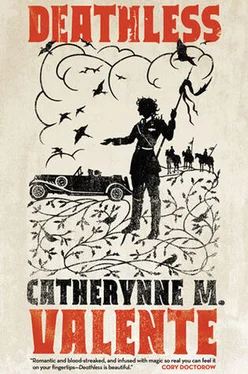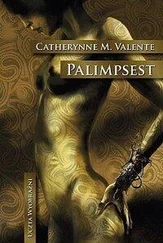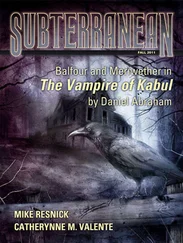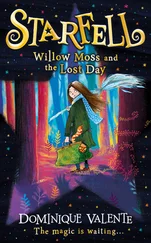“How delightful to meet another vila! One’s countrymen are always a comfort. No, dear.” Madame Lebedeva smiled, her charm perfect, ripe, chill. She had practiced in the mirror for days. “I have a delicate constitution. Marya will certainly have another bowl of your captivating ukha, however! Humans are so robust. Is that sturgeon I smell in the broth?”
“Very perceptive, Madame. And the chef sends his compliments on your production of Tuesday last. Pelicans will surely be all the rage next season.”
Lebedeva scowled. The waiter turned his attention to Marya, his pale eyes moist with anticipation. For her own part, Marya wanted no more fish stew, though it warmed her with a delicate, salty, dill-rich flavor. She was quite full—but she loved to make Madame Lebedeva happy, and what made her happy, chiefly, was ordering others about.
The waiter bent to speak more intimately with them. His skin smelled like frozen pine sap.
“If Comrade Morevna would be interested, I myself have been working on a small glamour she might enjoy. It’s nothing, really,” he demurred before Marya could say anything at all. “But if you like it, perhaps you could whisper a word to the Tsar?”
“I … I’m hardly a judge. I know nothing about the business of magicians.”
“Marya,” whispered Lebedeva, “surely you know how this works. We took extensive notes on our visits to Moscow.”
“Yes, but in Moscow this sort of cafe is for writers .” Lebedeva and the waiter both looked pleasantly perplexed, disliking to be shown up, but gladdened all the same, certain now to receive a lesson from the source. “Writers?” Marya said encouragingly. Speaking to the folk of Buyan was like walking on ice—they could be conversing just as smoothly as you please, and then suddenly Marya would fall through into their alien ideas, shocked at what they did not know. “Novelists? Poets? Playwrights?” Lebedeva sucked on her cigarette, which never seemed to get smaller, no matter how much ash fell from it like snow.
“I’m sure it sounds fascinating, dear. What are they, some sort of conjurers?”
“No, no, they tell stories. Write them down, I mean.” Marya grabbed at her tea to buy a moment’s thought. Buyanites had an insatiable lust for information about the human world, but anything Marya told them became a daring new fashion, spreading like gossip. She had to be careful. “A playwright writes a story that other people act out. They memorize the story and pretend that they are the heroines and villains of it. A poet writes one that rhymes, like a song.” Marya grinned suddenly. She shut her eyes and recited, the words coming back to her like old friends:
There, weeping, a tsarevna lies, locked in a cell.
And Master Grey Wolf serves her very well.
There, in her mortar, sweeping beneath the skies,
the demon Baba Yaga flies.
There Tsar Koschei,
he wastes away,
poring over his pale gold.
The waiter tucked his cloth under an arm and applauded vigorously. Lebedeva clapped her hands. “Oh, superb! It’s about us! How gratifying to be so recognized.”
Encouraged, Marya hurried on. “A novelist writes a long kind of story, with … a lot of smaller stories in it, and motifs, and symbols, and sometimes things in the story really happened, and sometimes they didn’t.”
The waiter wrinkled his lovely nose. “Why would you tell a story about something that didn’t really happen? At least the poetry was straightforward, manful. Not concerned with idle fancies, just a respectable census report!”
Marya slurped at her soup thoughtfully. “I suppose because it’s boring to keep telling stories where people just get born and grow up and get married and die. So they add strange things in, to make it more interesting when a person is born, more satisfying when they get married, sadder when they die.”
Lebedeva snapped her fingers. “It’s like lying!” she exclaimed. “Well, we understand that, of course! The bigger the lie, the happier the liar.”
“Yes, a little like lying. But…” Marya leaned in close to them conspiratorially. She couldn’t help it—she enjoyed being an expert, an acknowledged authority. Watching her opinions become fact. And as she lived and ate and slept in Buyan, she learned better to explain things so that her comrades could understand them. “But you know, a wizard with black hair and a thick mustache put a curse on Moscow, and Petrograd, too, so that no one would be able to tell the truth without lying. If a novelist wrote a true story about how things really happened, no one would believe him, and he might even be punished for spreading propaganda. But if he wrote a book full of lies about things that could never really happen, with only a few true things hidden in it, well, he would be hailed as a hero of the People, given a seat at a writers’ cafe, served wine and ukha, and not have to pay for any of it. He’d get a salaried summer on the dacha, and be feted. Even given a medal by the wizard with the thick mustache.”
The waiter whistled. “That’s a good curse. I should like to shake that wizard’s hand and buy him a vodka or two.”
“Someone ought to write a novel about me,” said Lebedeva loftily. “I shouldn’t care if they lied to make it more interesting, as long as they were good lies, full of kisses and daring escapes and the occasional act of barbarism. I can’t abide a poor liar.”
“For a while,” said Marya Morevna, “I thought I might like to be a writer. I walked to school in the mornings and read poetry and wondered if I could be like the men and women in the reserved tea shops. If there was a story in me, somewhere deep, sleeping, waiting to wake up.”
“I doubt it.” Madame Lebedeva sniffed. “Your lying really needs work. Perhaps it’s because you’re so far from Petrograd. Curses haven’t much sticking power, geographically speaking. Honesty is such a nasty habit, dear. Like biting your nails.”
Just then, the round window of the cafe, fashioned from the lens of a whale’s eye, shook with a quiet tremor.
“It’s possible you chose an unfortunate poem to recite, my love,” said Madame Lebedeva, finally allowing herself a single, decadent slurp of her pale green soup. Her eyes slid closed in exquisite satisfaction. The waiter hurried off, suddenly quite interested in a table far across the room.
Outside, a black car approached. Its long nose sloped and curved like a merciless beak; its fenders hunched up as round as eggs. Like clever eyes, the windows narrowed. It was both like and unlike Volchya-Yagoda, the car who had borne Marya to Buyan. This one seemed wholly larger, more careful, more luxurious, more serious.
Below it, four yellow chicken legs loped gracefully on the road where wheels ought to have been, their black claws scrabbling at the hard snow.
Setting her silver spoon aside, Madame Lebedeva extinguished her cigarette on her plate, then retrieved it with a flourish, whole and unsmoked, tucking it into her hat.
“Much as you know I adore you, devotchka, there is about to be far too much excitement in here for my poor little heart. I believe I shall adjourn myself to the cigar room and snuffle out their oldest yaks blood. To settle my stomach.”
Lebedeva left in a flurry of feathers and pale, swinging hair—she did everything in a flurry. Marya Morevna blinked twice and glanced nervously at the car again, its chicken legs shuffling back and forth on the icy cobbles. Her own stomach quavered—her body had learned to feel it deep in the guts when something strange was about to happen. This was useful, but uncomfortable. Marya kept her hands steady.
The cafe fell abruptly silent—a complete, profound silence, with no tinkle of plate or dropped cup to blemish it. The skin of the walls prickled in gooseflesh as a broad-breasted woman with a nose like an axe blade strode into the place, her throat swallowed up in a black fur coat, her white hair strangled back into a savagely tight chignon. She looked to her left, then her right; then her eyes fell on Marya Morevna like an old, fat crow settling on a branch. She seated herself with the confidence of a landlord; three waiters hurried to bring her tea, vodka, golden kvass in a fresh jar. A fourth appeared, a rusalka, his hair dripping wet, bearing a whole goose on a golden tray. The woman tore off a leg and bit into it, licking the juice from her slightly fuzzy chin. The waiter was obliged to stand, a piece of furniture hoisting the goose for her further enjoyment.
Читать дальше












